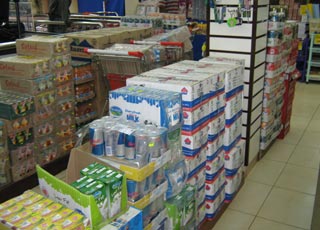
By Patrick Kagenda
Existing supermarkets sell about 30% Ugandan goods while the 60% is imported from Kenya, Dubai and South Africa.
Ugandan commodities include mineral water, sugar, Mukwano laundry soap, Mukwano cooking oil, Britannia juices and other juices from Ugandan cottage industries, Biscuits, Sweets, Nuts, Soft Drinks, Coffees, Honey, Milk, Beef, Sausages, Chicken, Fish, Eggs and a variety of vegetables including Garlic and Ginger, fruits like Banana’s, Pine apples, Oranges, Pawpaw, Foods like Irish Potatoes, Maize Flour, Rice, Millets and a host of body jelly for children.
Abubakar Aziz Kabuubi, a procurement officer at payless Supermarket say similar products from Kenya and South Africa are available. ‘We let a customer have a choice,’ he said.
But Aga Ssekalala of Ugachik, the biggest supplier of frozen chicken to the supermarkets, said Ugandans have a problem of being inconsistent, and failing to meet the acceptable standards.
“Some of these people we supply want consistency and high hygiene standards because they come and visit your factory before they accept your goods. Unless Ugandans overcome the weakness of inconsistency, and learn to maintain standards, our goods will always fail to appear on the big supermarket shelves” said Ssekalala.
Gideon Badagawa the Executive Director at Uganda Manufacturers Association said government needs to create an enabling environment and infrastructure for businesses to be able to meet the supply chain for these supermarkets which they can hardly meet as of today.
“We are likely to see Nakummat flood the market with Kenyan manufactured goods considering the fact that the government of Kenya has a very conducive manufacturing and infrastructure for its manufacturers,” he said.The other fear among existing supermarkets is that Nakummat could lure employees with higher salaries because they need experienced staff. Nakumatt is hiring 200 workers.
 The Independent Uganda: You get the Truth we Pay the Price
The Independent Uganda: You get the Truth we Pay the Price



